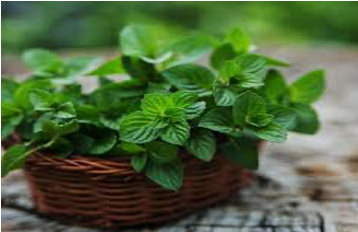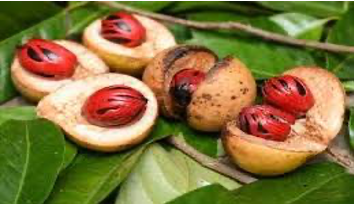Today’s herb is Mint
 Mint is the name for over a dozen plant species, including peppermint and spearmint, that belong to the genus Mentha.
Mint is the name for over a dozen plant species, including peppermint and spearmint, that belong to the genus Mentha.
While eating the plant offers some health benefits, research shows that several of mint’s health benefits come from applying it to the skin, inhaling its aroma or taking it as a capsule.
Mint is a particularly good source of vitamin A, a fat-soluble vitamin that is critical for eye health and night vision.
Health benefits of mint can be:
- as mints are potent sources of antioxidants, especially when compared to other herbs and spices. Antioxidants help protect your body from oxidative stress damage
- may improve IBS – taking peppermint oil improves symptoms
- may help relieve upset stomach and indigestion – several studies have shown that peppermint oil can speed up how quickly food moves through the stomach, relieving digestive symptoms associated with indigestion
- may improve brain function, alertness and help with memory loss
- may decrease breastfeeding pain simply by applying mint to the affected areas
- may improve cold symptoms – many over-the-counter cold and flu treatments contain menthol, a primary compound in peppermint oil, and although menthol in itself does not function as a nasal decongestant, it can provide some relief to cold and flu symptoms by subjectively improving breathing through the nose
- may mask bad breath – breath mints and chewing gums contain mint – a short term solution for bad breath; and drinking peppermint tea and chewing on mint leaves may beneficial in reducing bacteria in the mouth
Mint is easy to add to our diet and you can find it in many formats, fresh, dried, oil, teas and supplements.
Mint is safe to consume for most people, although consuming huge amounts can however lead to nausea and heart burn.
Mint is a good addition to have in your house, garden or balcony, they are very hardy and nice to add fresh to food and drinks.
If in doubt, as ever, please seek advice from a healthcare or medical professional.
Today’s spice is Mace
 Some people may think that mace is a liquid used in self-defence, however, mace in its natural form is not a man-made chemical product but a plant native to Malaysia, Indonesia, Sri-Lanka and the West Indian islands.
Some people may think that mace is a liquid used in self-defence, however, mace in its natural form is not a man-made chemical product but a plant native to Malaysia, Indonesia, Sri-Lanka and the West Indian islands.
Mace is derived from the Myristica fragrans plant which also gives us nutmeg. Often find that nutmeg and mace are used interchangeably on labels and in supplements.
There is however a difference between the two.
Nutmeg is the dried and shelled seed of the plant while mace is produced from the seed’s shell coating.
Mace is more commonly used in medicinal supplements because of nutmeg’s history of abuse as a psychoactive.
Mace spice is derived from the dried, outer aril of the nutmeg kernel. Despite being produced from the same fruit seed; mace has a higher concentration of volatile oils than nutmeg and produces a more intense aroma.
Health benefits of mace spice can be:
- can help keep the digestive system healthy – it relieves bloating, constipation and gas related problems and it is good for regulating bowel movements – it is also used to cure nausea, treat diarrhoea and flatulence
- can encourage appetite
- can boost blood circulation and this will
- keep your skin and hair healthy
- protect you from dangerous diseases and infections
- prevent diabetes and other life-threatening conditions
- can be a good stress buster – as surprising as this may sound, mace effectively eliminates tension and anxiety, and helps you feel calm and peaceful; it relieves mental exhaustion as well
- may improve dental health, it is a natural remedy for toothaches and aching gums and is used in several toothpastes too
- can help protect your kidneys – it stops kidney stones from developing in your body and if you have kidney stones, it dissolves them effectively – it is an excellent natural remedy for treating kidney infections and other kidney conditions
- can help protect you from colds, coughs, flu and viral diseases and it is also used to prepare cough syrups and cold rubs
- mace spice is also a good remedy for asthma patients
- has well known anti-Inflammatory properties
- it can treat joint pains and other inflammatory conditions
- it is considered effective for treating diseases such as arthritis and lumbago as well
- has well known antifungal, antidepressant and aphrodisiac properties
Mace should be safe for most people, but consumption of large amounts of mace spice and even nutmeg may cause sweating, palpitations, headache, body pain and in the severe cases, hallucination and delirium.
Mace should be avoided in pregnancy and when breast feeding.
If in doubt, as ever, please seek advice from a healthcare or medical professional.
